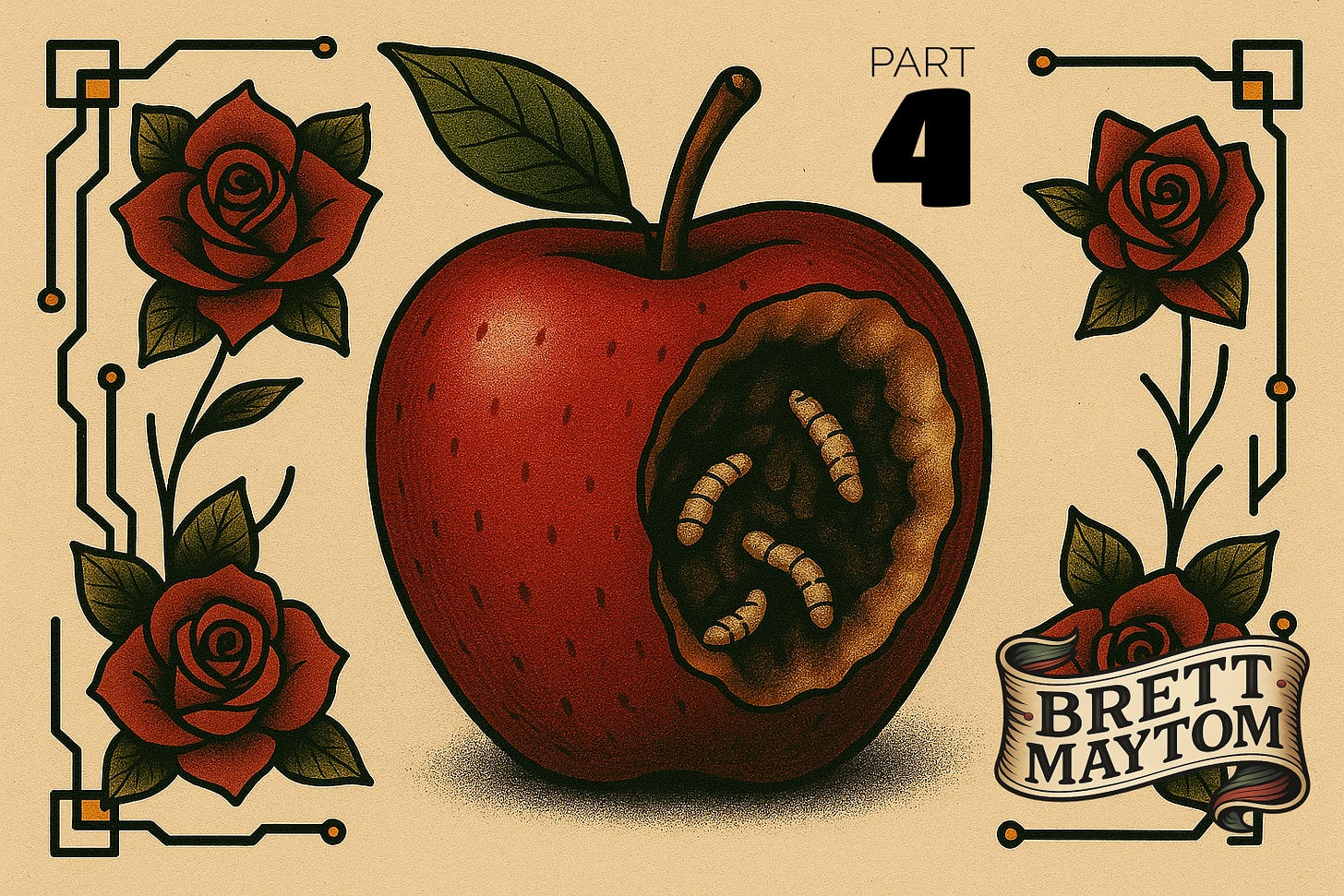Rotten Agile: Part 4 – Dogma, Ego, and Tribalism
When loyalty replaces learning, and rivalry replaces rigour, the agile market stopped evolving.
The agile marketplace isn’t just fragmented, it’s eating itself alive. What should be sharp, healthy debate has descended into tribalism, grudges, and ideological turf wars. Improvement is no longer the goal. Instead, we see camps defending territory, attacking rivals, and clinging to market share.
Many professional trainers, PSTs, CSTs, RSTs are deeply capable, with rich experience. But they’re often treated as enemies. Not because of what they teach, but because of which logo sits on their profile. It’s not about values or evidence. It’s about loyalty. For years, being both a PST and a CST was prohibited. Why? Not due to ethics or pedagogy, but because of a personal feud between Ken Schwaber and the Scrum Alliance leadership at the time. That’s not integrity. That’s dogma.
And that’s the only problem. When disagreement turns into heresy, evolution stops. Frameworks become belief systems. Trainers become gatekeepers. Anyone who questions the doctrine risks exile. It’s a staggering contradiction in a field supposedly built on adaptation and learning.
You also see this mindset echoed in initiatives like Agile 2 and Amplio. These aren’t just alternative views, but they’re designed in directly attack Scrum. The messaging isn’t about advancing agility. It’s about tearing others down. The tone is bitter, the critiques personal. There’s no curiosity. No learning. Only resentment. Challenge their ideas and you won’t get a thoughtful response, you’ll likely get retaliation.
When SAFe entered the scene, it didn’t arrive as a collaborator. It came to dominate. The approach was launched aggressively, with little interest in working alongside others in the field. It wasn’t about solving the real scaling challenges customers were facing. It was about owning the market. And the agile marketplace didn’t take it lightly. The reaction was defensive, even hostile. What followed wasn’t constructive dialogue, but with a backlash. Instead of uniting around the shared challenge of scale, the market fractured further, driven more by competition than collaboration.
This kind of ideological warfare poisons the well. Professionals who genuinely want to help teams and customers are forced into silos. Respect is replaced by suspicion. Curiosity gives way to brand loyalty. Each camp believes it holds the moral high ground. Everyone else is painted as corrupt, incompetent, or dangerous.
What we are seeing is brand warfare, dressed up in a language of improvement. Many claims are made without substantiated data and facts. Often these attacks are followed by selling their own product which is ethically questionable. And don't get me started on people who repeatedly call out dogma. What they never seem to realise is that their own ideology is just another dogma in disguise.
To those looking in from the outside, it looks like chaos. A profession at war with itself. Fractured. Defensive. Contradictory. What executive would trust a field that behaves like this?
Architecture, scientific research, aerospace and even accounting are all competitive fields with strong opinions and high stakes. But they’re underpinned by mutual respect. Professionals may disagree, sometimes fiercely, but the goal is to push the field forward, not to guard turf. Disagreement isn’t treated as a personal attack. It’s part of the process. You challenge ideas to improve them. You argue to learn. That’s how progress happens. Agile should be no different.
In contrast, agile argues to win.
Tribalism, fuelled by dogma and ego, isn’t just unprofessional, it’s destructive and unsustainable. If we want the agile industry to survive, we must call out posturing for what it is and rebuild a culture grounded in critical thinking and mutual respect. Loyalty must give way to learning. Rivalry must be replaced with rigour.
Tribalism, Dogma is rife in the agile market and a systemic problem. It’s not going to go away - there is too much bad blood.
Practiqaul™ is different. The community co-creates everything, the approach, the patterns, the courseware, and the toolkits. There are no turf wars here. There are no organisation is trying to outshine the rest. We don’t compete over whose framework is better. We focus on what works.
Practiqaul™ offers a guiding approach, not a rival product. Companies aren’t expected to adopt a one-size-fits-all framework. They build their own frameworks, shaped by the Practiqaul™ concepts and structures. They’re free to choose a flow-based model, and blend in ideas from Scrum, or even draw on scaling patterns. It is whatever fits their context. What matters is not branding. It’s more about fit-for-purpose thinking. There’s no need to defend a framework. Just the freedom to build what works for your customers or employer. That’s the a big difference.
Before you ask, I am not selling frameworks, training or consulting, but attempting to address serious dysfunction in the agile marketplace. If you become a member, you with other community members own the approach and practices. I will explain protection role of the IPAA role at a later date, it’s a complex topic - so please don’t jump to conclusions yet.
Are you over the agile circus too?
I’m gathering voices who want to step off the merry-go-round. If that’s you, comment below or message me privately. Let’s talk about what’s next as I am in startup phase.
Series posts
Read other posts in this series

